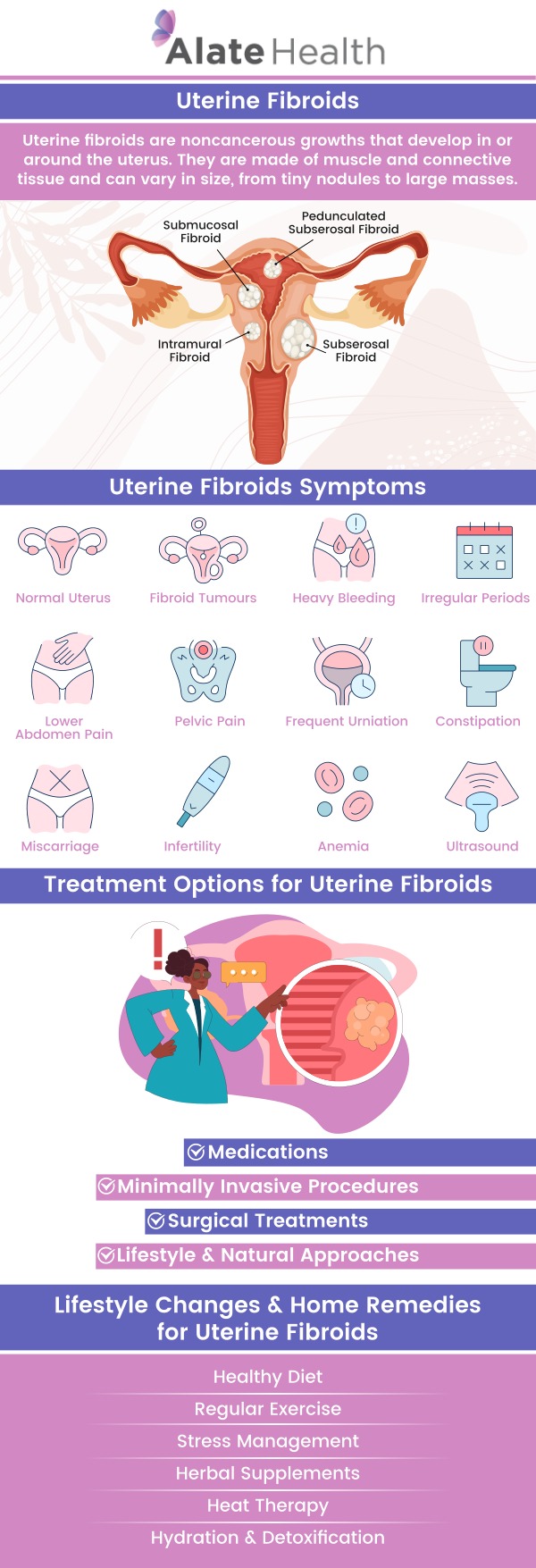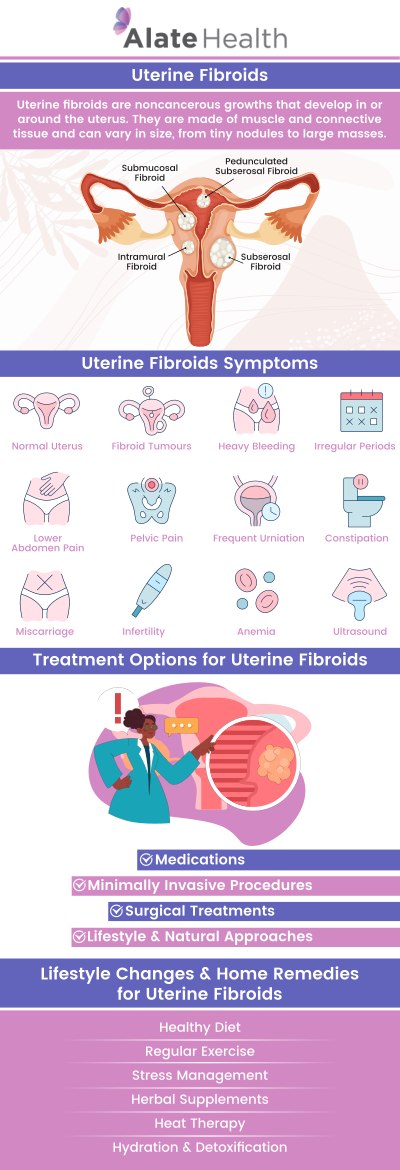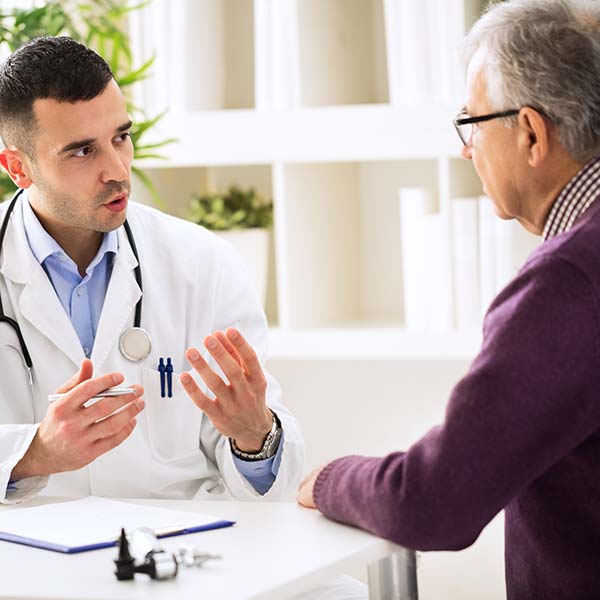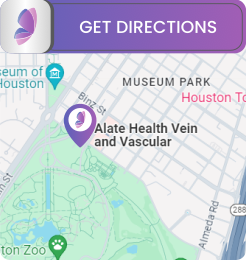Uterine Fibroids: Causes, Symptoms, & Treatment
Uterine fibroids are non-cancerous growths that develop in the muscular wall of the uterus. They can vary in size from specks to large masses. While the exact cause of uterine fibroids is unknown, hormonal factors, including estrogen and progesterone, play a significant role in their development. Visit Andrew Doe, MD, to learn more about the treatment options available for uterine fibroids at Alate Health Interventional Radiology Clinic. For more details, contact us today or book an appointment online. We are conveniently located at 1213 Hermann Dr Suite 255, Houston, TX 77004.




Table of Contents:
What does fibroid pain feel like?
What is the most common cause of uterine fibroids?
What are the symptoms of uterine fibroids?
What happens if fibroids go untreated?
Fibroid pain, often associated with the lower abdomen and pelvic region, is one of the common conditions that we treat at Alate Health. The pain can manifest in various ways and can be characterized as a dull, heavy, or aching sensation. This pain can present as either constant or intermittent, and the intensity can range from mild discomfort to severe, debilitating pain.
We understand that often this pain intensifies during menstrual periods, thereby signaling a clear link between fibroid pain and the menstrual cycle. It’s also noted that in certain cases, fibroids can cause sharp, acute pain, typically the result of fibroid degeneration.
One of the key symptoms our patient report is a sense of pressure or fullness in the lower abdomen, often described as a feeling of ‘heaviness’. This sensation can extend to the lower back and can also result in frequent urination or constipation.
Our expert team knows that the location and size of the fibroids, among other factors, can influence the type and severity of the pain. Thus, our specialists are skilled in diagnosing and treating fibroids of all sizes.
While fibroid pain is not usually a sign of a medical emergency, sudden, severe pelvic pain, particularly when accompanied by excessive vaginal bleeding, could indicate a serious complication like a twisted fibroid or a burst cyst. We can provide immediate medical attention for any such conditions.
We recognize the many factors that contribute to the development of uterine fibroids, also known as leiomyomas. These non-cancerous growths that form in or around the uterus can greatly affect a woman’s quality of life, and we offer comprehensive care and innovative treatment options.
We understand the role that hormones play in the growth of fibroids, specifically estrogen and progesterone. These female hormones are essential for the regeneration of the uterine lining during each menstrual cycle and are suspected to encourage fibroid growth. This is supported by the higher number of estrogen and progesterone receptors found in fibroids compared to normal uterine muscle cells.
Our team also recognizes the genetic component of uterine fibroids. If a woman’s mother or their sister has or has had fibroids, her risk of developing them is significantly higher. We utilize the latest genetic research in our approach to care, understanding that fibroids possess genetic alterations that differ from what is normal in uterine muscle cells.
We also take into account the influence of certain growth factors, such as the insulin-like growth factor, which have been linked to fibroid growth. Lifestyle factors such as early onset of menstruation, obesity, diet, and alcohol consumption are also considered in our comprehensive approach to patient care.
Despite the presence of these potential risk factors, not every woman will develop fibroids. The risk varies from woman to woman, and many women with these risk factors do not develop fibroids. This complexity underscores the importance of an individualized approach to care, which is a cornerstone of our practice.
We specialize in providing cutting-edge, minimally invasive treatments for a variety of conditions, including uterine fibroids, also known as leiomyomas or myomas. Uterine fibroids are a type of non-cancerous growth that develops in the uterus; they occur most often during a woman’s childbearing years.
In many cases, women with fibroids may not experience noticeable symptoms, and these fibroids are often first discovered during routine pelvic exams. However, if symptoms do occur, they can vary greatly from woman to woman.
Among the most common associated symptoms of uterine fibroids is heavy menstrual bleeding. This can lead to periods that last longer than a week and may also include the passing of clots. This can lead to anemia, causing fatigue and other complications.
Women may also experience a sensation of pressure or fullness in the lower abdomen due to the growth of the fibroids, which can result in frequent urination if the fibroid is pressing against the bladder. Pain or discomfort occurring during sexual intercourse is another symptom that some women with fibroids may experience. Other potential symptoms include backache or leg pains, constipation, and a swollen abdomen.
We understand the many health complications that can arise from untreated fibroids, also known as uterine fibroids. These benign growths in the uterus, while not cancerous, can lead to a myriad of potential health concerns if not promptly and properly addressed.
One of the more common problems caused by untreated fibroids is extended or excessive menstrual bleeding, which can lead to anemia. Anemia, characterized by a drop in the body’s red blood cell count, can lead to several symptoms like fatigue, shortness of breath, and even heart-related complications.
Untreated fibroids can also cause discomfort or pain. Depending on their size as well as their location, fibroids can exert pressure on the bladder, causing frequent urination, or press against the rectum, leading to constipation. There are also instances when women may suffer from lower back or pelvic pain due to these fibroids.
In the realm of fertility and pregnancy, fibroids can be significant obstacles. They can obstruct the fallopian tubes, effectively preventing sperm from reaching the egg. Furthermore, during pregnancy, fibroids may increase the risk of miscarriage, preterm birth, or delivery complications. In some cases, fibroids can deform or obstruct the uterus, making it difficult for an embryo to implant successfully.
While it’s rare, untreated fibroids can potentially lead to a type of cancer known as leiomyosarcoma. However, it’s critical to understand that the likelihood of a fibroid transforming into a cancerous growth is extremely low.
Another concern is that untreated fibroids can continue to grow in size, potentially resulting in a condition known as a twisted fibroid, which can cause severe pain and may necessitate immediate medical attention. For more details, contact us today or book an appointment online. We are conveniently located at 1213 Hermann Dr Suite 255, Houston, TX 77004. We serve patients from Houston TX, Bellaire TX, Jacinto City TX, Spring Valley Village TX, Stafford TX, Bunker Hill Village TX, and surrounding cities.

Additional Services You May Need
▸ Adenomyosis
▸ Enlarged Prostate
▸ Leg Ulcers
▸ Joint Pain
▸ Varicose Veins
▸ Uterine Fibroids
▸ Pelvic Congestion
▸ Vascular Malformations
▸ Dialysis/Renal Failure
▸ Port and PICC Placements
▸ Peripheral Arterial Disease
▸ Primary and Metastatic Liver Cancers
▸ Hemorrhoid Artery Embolization (HAE)







